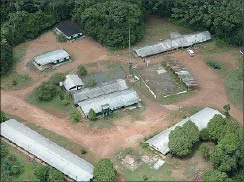
Home » Investors buy into Gold Reserve
Investors buy into Gold Reserve
Bellevue groups purchase $26.6 million in stock

May 5, 2011
Bellevue-based Steelhead Partners LLC and related concerns in recent months have bought $26.6 million worth of stock in Spokane-based mining-exploration company Gold Reserve Inc., say documents filed with the U.S. Securities and Exchange Commission earlier this week.
The investment represents about 11.7 million shares, or about 20 percent of the Gold Reserve's common stock.
The bulk of the stock purchases occurred between Feb. 23 and April 20, with prices ranging from $1.58 a share to $1.75 a share. Stock in Gold Reserve (AMEX: GRZ) traded at $1.76 a share at market close on May 3.
The company's stock has traded at less than $2 a share since early 2008, but had been mostly in the $4-to-$6 range for the two years before that, and had climbed briefly to over $9. Its 52-week low is 68 cents, but it climbed steadily through the latter half of last year until leveling off in January.
Gold Reserve formed in 1998, but its roots date back to the 1950s. The company technically is Canadian, but its executive offices are located in downtown Spokane.
Attempts to reach a Steelhead Partners representative were unsuccessful. On Steelhead's website, however, the company describes itself as a value investor, saying, "Our investment style is characterized by finding names that are out of favor and under-followed by Wall Street; historically, this has consistently led us to opportunities with exceptional risk/reward profiles."
Gold Reserve President Doug Belanger also couldn't be reached.
An SEC filing lists the purchasers as Steelhead Partners, Steelhead Navigator Master LP, and Steelhead co-founders James Michael Johnston and Brian Katz Klein. The stock buyers state in the filing that the purchase is for investment purposes and isn't an attempt to take control of Gold Reserve.
Gold Reserve was the target of a hostile-takeover attempt by Vancouver, British Columbia-based Rusoro Mining Ltd. in late 2008. A Toronto judge blocked the attempt early in 2009, and Rusoro withdrew its offer.
Gold Reserve doesn't currently have any active exploration projects. For 2010, it reported a net loss of $23.5 million, or 41 cents a share, compared with a net loss of $165.4 million, or $2.89 a share, in 2009.
For 2010, the company reported income of about $960,000, down from income of about $3.1 million in the year-earlier period.
The 2009 results included a $150.7 million noncash write-off of capital costs associated with its Brisas project in Venezuela, for which the Venezuelan government reversed earlier regulatory approvals after Gold Reserve had invested nearly $300 million in exploration.
Gold Reserve since has entered into arbitration with Venezuela.
In its 2010 annual report, released on March 30, the company said it spent $6.2 million on arbitration last year, and its primary objective this year is to complete that arbitration.
The company is seeking $1.9 billion in losses and damages from Venezuela for that country's allegedly wrongful conduct and said it will continue to pursue an "amicable settlement" that could include money, participation in a mining project there, or a combination of the two options.
Gold Reserve also said it wants to dispose of previously purchased Brisas assets this year, which originally cost about $39 million and have an estimated current value of about $28 million.
The company, which had focused substantially on Brisas from 1992 to 2008, had envisioned an open-pit gold and copper mine there that would have cost about $731 million to construct and get into production.
Once the mine was up and running, Gold Reserve estimated it would be productive for 18 years.
The company's most recent operating plan for Brisas listed proven and probable ore reserves of about 10.2 million troy ounces of gold and 1.4 billion pounds of copper, and it estimated annual production of 457,000 ounces of gold and 63 million pounds of copper.
The company has another property in Venezuela, called Choco 5, but it ceased exploration there after Venezuela seized Brisas.
The company said in its 2010 annual report that it will continue to evaluate and pursue alternative industry opportunities in 2011 and beyond.
Latest News
Related Articles


_web.webp?t=1769673727)
_web.webp?t=1769673728)
_web.webp?t=1769673735)
